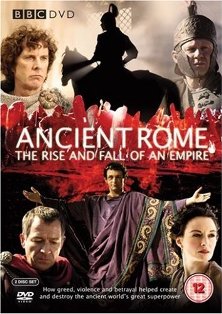Ancient Rome: The Rise and Fall of an Empire
| Ancient Rome: The Rise and Fall of an Empire | |
|---|---|

BBC DVD Cover
|
|
| Genre | Docudrama |
| Written by | |
| Directed by |
|
| Starring | |
| Narrated by | Alisdair Simpson |
| Composer(s) | Samuel Sim |
| Country of origin | United Kingdom |
| Original language(s) | English |
| No. of episodes | 6 |
| Production | |
| Executive producer(s) | Matthew Barrett |
| Producer(s) | Mark Hedgecoe |
| Running time | 60 minutes |
| Distributor | BBC |
| Release | |
| Original network | BBC One |
| Original release | 21 September – 26 October 2006 |
| Chronology | |
| Related shows |
Heroes and Villains Rome: Rise and fall of an empire |
Ancient Rome: The Rise and Fall of an Empire is a 2006 BBC One docudrama series, with each episode looking at a different key turning points in the history of the Roman Empire. This docudrama focuses on the Latin-speaking western half of the Roman Empire.
Series Producer Mark Hedgecoe has stated that he made the series in response to previous films that "have tended to ignore the real history and chosen to fictionalise the story."
The series was filmed with the Panasonic SDX 900 DVCPRO50 professional camcorder in widescreen progressive scan mode at 25 frames/s. According to Mark Hedgecoe, a standard definition format was chosen largely because it was more forgiving to focusing errors and required less light than high definition, thus speeding up the shooting. In his opinion, the camera delivered better footage than a Digital Betacam camera, and provided rich, filmic feel, which was well-suited to capturing the gritty reality of the Roman Empire.
The series was co-produced by BBC, ZDF and the Discovery Channel.
BBC History commissioned the online-game CDX to tie-in with the series.
Historical novelist Lindsey Davis writing in The Times points out that "the episodes were produced by different teams" and "it shows," stating episodes 3 and 4 work better than episodes 1, 2, and 5 and although she hasn't seen the final episode, she wants to watch it and she "can’t say fairer than that." She compliments the producers who "avoid the talking-heads style, though they use literature and the advice of modern historians," but criticises the series in that "once they fill up with battle and crowd scenes, the formula of self-contained one-hour dramas doesn't give enough scope," and because "we don’t see many women in this series." She concludes that "there is pleasing material here," stating, "the filming is good, the dialogue sounds real, the sets work, the military scenes will delight many," but she criticises the decision to not broadcast the episodes in chronological order as, "if they stick with their eccentric programming, we’ll be jerked about maniacally," stating, "this is history on the Eric Morecambe principle: all of the moments — but not necessarily in the right order!"
...
Wikipedia
